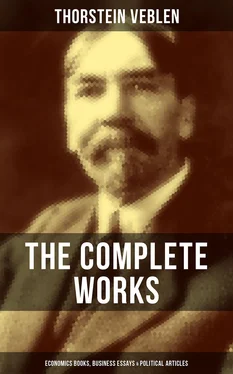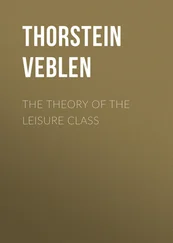In the shifting of activities, ideals and aims so brought in with the advent of wealth and ownership, the part of the priests and their divinities is not to be overlooked, for herein lies one of the greater cultural gains brought on by the technological advance at this juncture.
The margin of service and produce available for consumption in the cult increases, and by easy consequence the spiritual prestige and the temporal power and prerogatives of the priesthood grow greater. The jurisdiction of the gods of the victors is extended, through the vicarious power of the priests, over the subject peoples, and as the temporal dominion is enlarged and an increasing measure of coercion is employed in controlling these dominions, so also in the affairs of the gods and their priests there is an accession of power and dignity. It commonly happens where predatory enterprise comes to be habitual and successful that the temporal power tends to centre in an autocratic and arbitrary ruler; and in this as in so much else, spiritual affairs are likely to take their complexion from the temporal, resulting in a strong drift toward an autocratic monotheism, which in the finished case comes to a climax in an omnipotent, omniscient deity of very exalted dignity and very exacting temper. For the habits of thought enforced in the affairs of daily life are carried over into men’s sense of what is right and good in the life of the gods as well. If there is any choice among the gods under whose auspices a people has successfully entered on a career of predation, so that some of the gods have more of a reputation for rapacity and inhumanity than others, the most atrocious among them is likely, other things being equal, to become the war-god of the conquering host, and so eventually to be exalted to the suzerainty among the gods, and even in time to become the one and only incumbent of the divine czardom.
Should it happen that a relatively humane, tolerant and tractable deity comes in for exaltation to the divine suzerainty, as well may be if such a one has already a good prior claim standing over from the more peaceable past, he will readily acquire the due princely arrogance and irresponsibility that vests the typical heavenly king. It may be added that as a matter of course no degree of imputed inhumanity in the most high God will stand in the way of a god-fearing and astute priesthood volubly ascribing to him all the good qualities that should grace an elderly patriarchal gentleman of the old school; so that even his most infamous atrocities become ineffably meritorious and are dispensed of his mercy. 104
With the terrors of a jealous and almighty God behind them, and with faith in their own mission and sagacity in its administration, the priesthood are in a position to make the affairs of the heavenly king count for much in the affairs of men; more particularly since this spiritual power enters into working arrangements with the temporal power; so that in the outcome these institutions which in their origins have grown out of a precarious margin of product above subsistence come to possess themselves of the output at large and leave a precarious margin of subsistence to the community at large. 105
These further matters of “natural law in the spiritual world” are not in themselves of direct interest to the present inquiry, and they are also matters of somewhat tedious commonplace. Yet this run of things has grave consequences in the further working-out of the technological situation as well as in the course of material welfare for the community on whom it is incumbent to turn the technological knowledge to account, to conserve or improve and transmit it, and for this reason it has seemed necessary summarily to recall those general features of the cultural scheme that are inherently associated with the earlier pecuniary culture, - the full-blown barbarian culture. And it seems pertinent also to add something further in the same connection before leaving this aspect of the case.
It is necessary to hark back to what was said in an earlier chapter, of the relations of tillage and cattle-breeding to the instinct of workmanship and the course of technological advance. Both the technological and the institutional bearing of cattle-breeding is particularly notable in this connection. As already spoken of in what has gone before, cattle-breeding has the technological peculiarity that it may be successfully entered on and carried forward with a larger admixture of anthropomorphic concepts than the mechanic arts, or even than the domestication and care of the crop plants. It is perhaps not to be admitted that the penchant of early man to take an anthropomorphic view of the lower animals and impute to them the common traits of human nature has directly conduced to their successful domestication, but it should be within the mark to say that this penchant may have been primarily responsible for the course of conduct that led to the domestication of animals, 106and that it has apparently never been a serious drawback to any pastoral culture. Now, wealth in flocks and herds is peculiar not only in being eminently portable, even to the extent that in the usual course of this industry it is necessary for a pastoral community to migrate, or to go over an extended itinerary with the changing seasons, but it has also the peculiar quality of mul-tiplying spontaneously, given only a degree of surveillance and a sufficient range of pasture lands. It follows that cattle are easy and tempting to acquire by predation, will accumulate through natural increase without notable exertion on the part of their owners, and will multiply beyond the bearing capacity of any disposable range. Hence a pastoral people, or a people given in great part to pastoral pursuits, will somewhat readily take to a predatory life; will have to be organised for defence (and offence) against raids or encroachments from its neighbours engaged in the same pursuits; will find itself short of range lands through the natural increase of its flocks or herds, and so will even involuntarily be brought into feud with neighbouring herdsmen through mutual trespass. Further, the work of herding, on the scale imposed by the open continental cattle and sheep ranges, is man’s work, as is also the incidental fighting, raiding, and cattle-lifting.
The effects of these technological conditions on the general culture of a pastoral people are such as are set forth in their most favourable light in the early historical books of the Old Testament, or such conditions as may be found today on the great cattle ranges of west and north-central Asia.
The community falls necessarily into a patriarchal régime; with considerable concentration of wealth in individual hands; great disparity in wealth and social standing, commonly involving both chattel slavery and serfdom; a fighting organisation under patriarchal-despotic leadership, which serves both for civil, political and religious purposes; domestic institutions of the same cast, involving a degree of subjection of women and children and commonly polygamy for the patriarchal upper or ruling class; a religious system of a monotheistic or monarchical complexion and drawn on lines of patriarchal despotism; with the priestly office vested in the patriarchal head of the community (the eldest male of the eldest male line) if the group is small enough to admit the administration of both the temporal and spiritual power at the hands of one man - as Israel at the time of the earlier sojourn in Canaan - or vested in a specialised priesthood if the group is of great size - as Israel on their return to Palestine.
Such a culture is manifestly fit to succeed both in avowedly predatory enterprise and in pecuniary enterprise of a more peaceable sort, so long as range lands are at its disposal or so long as it can find a sufficiently large and compact agricultural community to reduce to servitude, or so long as it can find ways and means of commercial enterprise while still occupying a position defensible against all comers. Its population is organised for offence and defence and trained in the habits of subordination necessary to any successful war, and the patriarchal authority and pecuniary ideals inbred in them give them facility in cooperation against aliens, as well as the due temper for successful bargaining. Such a culture has the elements of national strength and solidarity, given only some adequate means of subsistence while still retaining its militant patriarchal organisation. Not least among its elements of national strength is its religion, which fosters the national pride of a people chosen by the Most High, at the same time that it trains the population in habits of subordination and loyalty, as well as in patient submission to exactions. But it is essentially a parasitic culture, despotic, and, with due training, highly superstitious or religious.
Читать дальше












